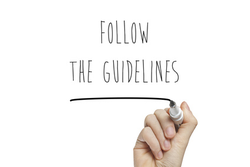Dec. 8, 2014
Breaking news

The Conseil d'État (French State Council)l issued a ruling Sept. 19, 2014, Agence pour l'enseignement français à l'étranger, which does not involve a regulated sector but is very instructive for all of them.
Indeed, the term "guidelines" is common in how each and designates certain documents prepared by the regulatory authorities. These give themselves this appellation to documents made ex ante to give operators the "outline" of the future action of the regulator. Thus, the "guidelines" would produce legal certainty while maintaining flexibility, since in the future the authority will continue to set its position on a case by case basis.
This convinced the Conseil d'État, which expressed his support for the "droit souple (soft law)" in its annual report in 2013.
Now comes the case: it was necessary that the "hard right" come bless the "soft law".
In this case, was challenged before the administrative judge an "instruction" from this Agency for French Teaching Abroad for the "consideration of the financial situation of the parents" seeking a scholarship to the child. A local agency for awarding grants had rejected a request no meeting the criteria developed in the statement. Parents have acted appeal for abuse of power. They both lost before the Cour administrative d'appel de Paris (Administrative Court of Pari) that before the Conseil d'État.
However, the Council recognizes that the Agence pour l'enseignement français à l'étranger has no regulatory power. But the judgement takes in considération that:"l'instruction en cause a énoncé, à l'intention des commissions locales, des lignes directrices, sans fixer de normes à caractère général qui se serait imposée de matière impérative à ces commissions"!footnote-8 .
Triumph of soft law!
Thus, organizations, "agencies", may take "general guidelines" here which do not contain any threshold and generating no rights, on which the commission take real decisions. These are based on the first document, but because of the "flexibility" of it, the one whose solution is affected by the particular decision does'not have the right to appeal.
All the beauty and effectiveness of "soft law". The judge, after having boasted, now offers it royal way.
Nov. 5, 2014
Thesaurus : Doctrine
Référence complète : Entretien avec Jacky Richard, rapporteur général de la secteur du rapport et des études du Conseil d'État, et Laurent Cytermann, rapporteur général adjoint, "Et si le droit souple était l'avenir du droit dur ?", Les Petites Affiches, 5 nov. 2013, p.4-8.
____
Les étudiants de Sciences Po peuvent lire l'article par le Drive de Sciences Po (dossier "MAFR - Régulation").
____
Updated: Dec. 19, 2011 (Initial publication: July 5, 2011)
Sectorial Analysis

Translated Summaries
ENGLISH
A recommendation concerning professional “good practices” in pharmaceutical treatments issued by the Haute Autorité de la Santé (French Healthcare Regulator) was attacked before the Council of State by an association. It was invalidated by Council of State decision on April 27, 2011 for violation of the principal of impartiality, because members of the regulator’s working group had interests in the pharmaceutical industry.
ITALIAN
Relazione di settore (Salute): Una raccomandazione sulle “buone prassi” pubblicata dall’Autorità di regolazione in material di salute è stata annullata a ragione della sua parzialità
Una raccomandazione relativa alle “buone prassi” nei trattamenti farmaceutici resa dalla Haute Autorité de la Santé (l’autorità francese di regolazione in materia di salute) era stata contestata da un’associazione dinanzi al Consiglio di Stato. Il 27 aprile 2011, il Consiglio di Stato ha annullato tale raccomandazione in quanto resa in violazione del principio d’imparzialità, diversi membri del gruppo di lavoro nominati dall’autorità di regolazione avevano interessi personali nell’industria farmaceutica.
SPANISH
Informe Temático (Salud): Una recomendación concerniendo las “buenas prácticas” publicada en por el regulador francés de la salud fue invalidada por razones de parcialidad.
Una recomendación concerniendo las “buenas prácticas” en tratamientos farmacéuticos publicada por la Haute Autorité de la Santé (el Regulador francés de la salud) fue atacada frente al Consejo de Estado por una asociación. Fue invalidada por el Consejo de Estado en una decisión del 27 de abril del 2011 por violación del principio de la imparcialidad, porque miembros del grupo de trabajo del regulador tenían ciertos intereses en la industria farmacéutica.
PORTUGUESE
Informe setorial (Saúde): Uma recomendação relativa a “boas práticas” publicada pelo regulador francês de saúde foi anulada por motivos de parcialidade.
Uma recomendação relativa a “boas práticas” em tratamentos farmacêuticos adotada pela Haute Autorité de la Santé (Regulador francês de saúde) foi atacada perante o Conselho de Estado por uma associação. Ela foi invalidada pela decisão do Conselho de Estado de 27 de abril de 2011 por violação do princípio da imparcialidade, pois alguns membros do grupo de trabalho do regulador tinham interesses na indústria farmacêutica.
Revogação – Ônus da prova – Conflito de interesses – Deontologia – Ex post – Boas práticas – Guia – Hard Law – Haute Autorité de la Santé (Regulador Francês da Saúde) – Imparcialidade – Independência – Legislador – Responsabilidade – Programa de tratamento médico – Obrigação – Parcialidade – Indústria farmacêutica – Recomendação – Ciência – Autoridade científica – Dados científicos – Grupo de trabalho.*
* Em The Journal of Regulation, estas palavras-chave são fornecidas pelo Editor e não pelo Autor.
.....................
Other translations forthcoming.
Updated: Aug. 31, 2011 (Initial publication: July 4, 2011)
Contributions

